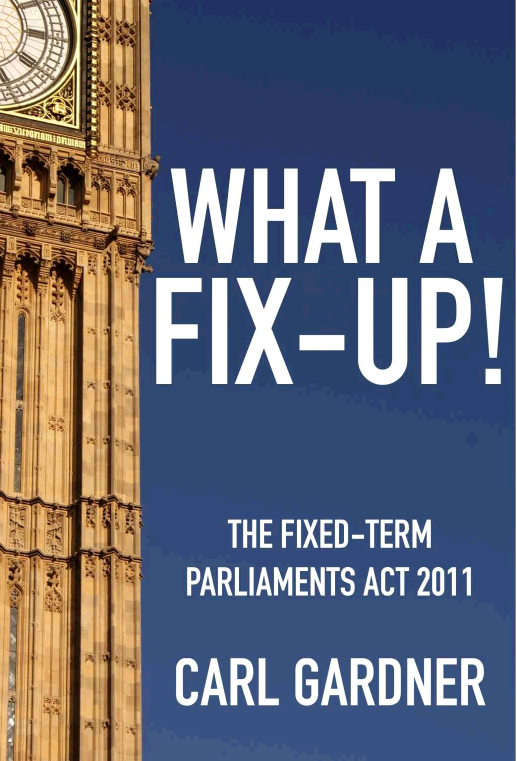Rolling review – What a Fix-Up!: The Fixed-term Parliaments Act 2011 by Carl Gardner
What a Fix-Up!: The Fixed-term Parliaments Act 2011 was published (as a Kindle download) on 5 May, just two days before the 2015 General Election. Its author, Garl Gardner, is a barrister who worked for 12 years as a lawyer in government service and currently writes the Head of Legal blog. He also teaches law and… Continue reading
What a Fix-Up!: The Fixed-term Parliaments Act 2011 was published (as a Kindle download) on 5 May, just two days before the 2015 General Election. Its author, Garl Gardner, is a barrister who worked for 12 years as a lawyer in government service and currently writes the Head of Legal blog. He also teaches law and writes law reports for ICLR.
Given its immediate relevance to current events, and the pressure of time, I propose to review this book in stages, chapter by chapter, as I read it. I begin with Chapter 1, which is relevant to the immediate aftermath of a general election if, as seems likely, no single party commands an overall majority in the House of Commons.
 Chapter 1 is entitled “A Very Basic Guide to the Constitution”. It provides a very useful primer on constitutional law for any student or, indeed, any political pundit wishing to analyse the events in the next few days.
Chapter 1 is entitled “A Very Basic Guide to the Constitution”. It provides a very useful primer on constitutional law for any student or, indeed, any political pundit wishing to analyse the events in the next few days.
It explains that we do not, in the UK, have a written constitution; and even if we did, it would not contain all the constitutional rules that applied. However, some of our constitutional rules are written, in the form of statutes, such as the Bill of Rights 1688 and the Human Rights Act 1998, and indeed the Scottish Parliament Act 1988.
Some of our constitutional rules consist of conventions, which are not hard and fast rules but have a flexibility and “wriggle room” that enables them to develop, a bit like the Common Law itself, to adapt to changing circumstances. A typical convention (dating from the last century) is that the Prime Minister should be a member of the House of Commons. A more recently developed convention is that the government should seek the approval of the House of Commons for any proposed (but not emergency) military action.
A third form of constitutional rule consists in the prerogative powers which, under common law, empower the Crown, acting through ministers, to make treaties or to go to war. Both conventions and prerogative powers can be overwritten by statute. Attorney-General v De Keyser’s Royal Hotel Ltd is cited as a key authority here (albeit using the unofficial BAILII neutral citation [1920] UKHL 1 rather than the official series Law Reports citation [1920] AC 508.)
Pundits pay attention
The rest of the chapter discusses “Elections and Parliamentary government“. This is the bit the pundits really need to concentrate on, because it explains how a new Prime Minister is appointed, and what happens in the event that no single party or party leader commands an overall majority in the House of Commons. A number of popular misconceptions are debunked, including misunderstandings about what actually happened in 2010 before the formation of the current coalition.
Ultimately the question is who is best placed to command the confidence of the House, which need not depend on their having already forged a coalition.
Once a Prime Minister has been appointed, he or she advises the monarch on the ministers to be appointed. The next test of any incoming government, however formed, majority or minority, is the Queen’s Speech. Again, there is a myth that this is pure pageantry. It is dressed up in a lot of flummery and tradition, but underneath it all is a vote of confidence. This is where the majority of the House is needed. Lose that vote, and we could be back to square one.
UPDATE: Day Two (8 May)
Today we look, non-sequentially, at chapter 6. This is headed “The 2015 Parliament and the Act”.
It isn’t an amazingly prescient prediction of what has come to pass, but it does analyse the actual result, a Conservative majority government, as one of three possible scenarios in which the Act may be significant.
In this scenario, it then questions what would happen if, faced with an awkward amendment to the Queen’s Speech relating to the EU referendum, Cameron actually lost the vote (of confidence) on the Queen’s Speech. According to convention, he would need to resign, as Stanley Baldwin did in 1924, leaving the Queen, unable to agree to the calling of a second election (by reason of the Act, as well as convention) to ask Ed Miliband to be PM and form a weak minority government.
It’s an interesting scenario, used in part to demonstrate how the Act might create a different outcome from the old conventions; for, under section 2(1) of the Act, Cameron and Miliband could agree immediately to a fresh election.
Gardner goes on to consider a number of other scenarios. Contacted on Twitter, he has admitted that he may well have to re-edit or update the book to take account of unfolding events. It is quite exciting to be so close to the coalface of constitutional law. Interesting (if in other respects depressing) times!
See also: my *sneak preview* of the Queen’s Speech, based on the Tories’ election manifesto and other manifest intentions for law and justice.
That’s it for now. I will continue this rolling review in the days to come, with the benefit of news as it breaks.
This review is being written by Paul Magrath, Head of Product Development and Online Content at ICLR. It expresses a personal view and does not necessarily represent the views of ICLR as an organisation.